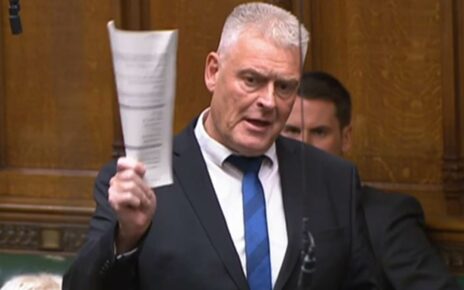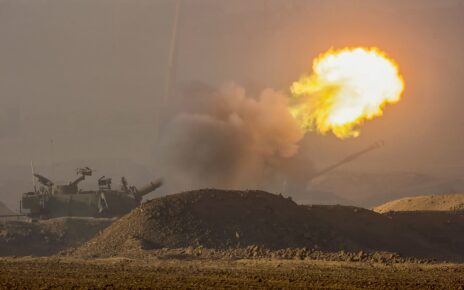Save articles for later
Add articles to your saved list and come back to them any time.
Dubai: As Gaza crumbles under Israel’s most sustained and aggressive military operation in decades, the future of the enclave grows ever more uncertain.
In the six weeks since Hamas terrorised Israel, killing 1200 people, mostly civilians, and kidnapping hundreds, more than 12,000 Palestinians in Gaza have also paid with their lives.
Almost 1.5 million Palestinians have been displaced by the Israeli bombardment of the Gaza Strip since October 7.Credit: AP
While Israel stares down international pressure for a ceasefire, world leaders and diplomats grapple with the question of what life will look like for Palestinians after the last Israeli bomb falls.
Even if Israel achieves its goal to dismantle Hamas’ political and military arms, what comes next for Gaza, and who fills the political vacuum left in its wake?
In Tokyo, US Secretary of State Antony Blinken insisted any future governance must be Palestinian-led, with Gaza and the West Bank unified under the Palestinian Authority.
But a defiant Israeli Prime Minister Benjamin Netanyahu flatly rejected any role for the Palestinian Authority in the Gaza Strip if ever the mission to weed out Hamas succeeds. The Israeli Defence Forces would remain in control of the strip for “as long as necessary”, he said, vowing Israel would not give it to “international forces”.
US President Joe Biden, however, pushed back on any increased role for Israel, telling Netanyahu only a two-state solution would do, and adding that occupying Gaza would be “a big mistake”.
While the US and much of Europe see the Palestinian Authority as the only genuine alternative to Hamas, it is woefully unpopular among most Palestinians who see it as weak, corrupt, ineffectual, and led by an 87-year-old president Mahmoud Abbas in his 18th year of a four-year term that expired in 2009.
For decades, the authority has been responsible for security in parts of the Israeli-occupied West Bank, yet violence there has risen exponentially. At least 186 Palestinians, including 51 children, have been killed by Israeli forces in the West Bank since the October 7 Hamas attack, according to UN figures. An additional eight have been killed by Israeli settlers, while four Israelis have been killed in attacks by Palestinians, according to the figures quoted by Reuters.
Other actors being floated as potential guardians of the enclave include a multinational coalition of Arab states, neighbouring Egypt, and the United Nations until a transition to self-government can take place.
Muslim worshippers were refused entry to the Al-Aqsa Mosque in Jerusalem.Credit: Kate Geraghty
Filling the looming political vacuum that will likely emerge when the acute fighting eases may be the hardest piece of the puzzle, said Monica Marks, political scientist in Islamist movements at New York University’s Abu Dhabi campus.
“It seems like Israel has sallied forth with very little thought to ‘day-after’ scenarios, and whichever power assumes the governing reigns in a transitional period … it’s going to probably have to contend with a Hamas insurgency,” she said.
Saudi Crown Prince Mohammed bin Salman.Credit: AP
Military risks, economic cost and concerns about regional perceptions of “policing the rubble” on Israel’s behalf are all strong disincentives for Arab states to take on any sizeable role, Marks added.
“MBS in Saudi wants to build NEOM, he does not want to rebuild Gaza City,” she said, referring to Crown Prince Mohamed bin Salman and his $US500 billion ($770 billion) futuristic megaproject in the desert.
Nathan Brown, professor of political science and international affairs at George Washington University, said he believed the most likely outcome was an indefinite Israeli military presence in the Gaza Strip and a major shift in where and how surviving Gazans will live.
“That may be the outcome … shifting [Gazans] to the south, the destruction of Gaza City, and an ongoing Israeli security presence. And governance is just an afterthought. It’s deteriorated, and it’s not being replaced.”
Other floated scenarios, including handing control to a coalition of Arab nations temporarily, or a role played by the United Nations were “just an exercise in dreaming”, said Brown, who is a non-resident senior fellow at the Carnegie Endowment for International Peace.
“None of those are going to happen or are likely to happen … I really mean that what we’re seeing now is the indefinite future … what we’re seeing now is the new Gaza.”
US Secretary of State Antony Blinken met with Palestinian President Mahmoud Abbas on his recent diplomatic visit.Credit: Reuters
Retired US Lieutenant General Mark Schwartz, who served as the chief interlocutor between the US and the Palestinian Authority (PA) from 2019 to 2021, said any hope of future reform in Gaza would rely on a Palestinian-led capability robust enough to keep extremism out.
In the two years he spent as the US Security Coordinator for Israel and the PA, Schwartz has worked closely with PA Prime Minister Mohammad Ibrahim Shtayyeh and leaders in the West Bank, where he said rising settler violence poses one of the biggest ongoing security threats.
“You can’t establish governance until you have security established,” he said.
“My biggest concern is there is no rule of law enforcement for the settlers that live in the West Bank. And if that continues, combined with the [war] inside of Gaza, that could make the West Bank implode.”
Volunteer first aid responders watch a Palestinian youth during clashes with the Israeli military near the al-Jalazone refugee camp in Ramallah, West Bank.Credit: Kate Geraghty
While the US leads calls for the Palestinian Authority to be the post-war guardian of Gaza, Marks said Abbas may not be lining up for the job.
“Why would he want to deal with the complete mess…disruption, more radicalisation among the population and whatever insurgencies come next?” she said.
“The problem here is that none of these actors being debated have any legitimacy among Palestinians … It’s a menu of highly unpalatable options.”
More coverage of the Hamas-Israel conflict
- Hamas had bigger plans on October 7: Intelligence about Hamas’ motivations reveals an intention to strike a blow of historic proportions and provoke an overwhelming Israeli response.
- Escape from chaos: An Australian father faced a heartbreaking dilemma – whether to flee Gaza to his children, or stay with his wife.
- Open letters: Mass resignations, boardroom turmoil and angry donors are some of the ways the Israel-Hamas war is filtering down into Australia’s high-powered arts world.
- Gaza’s youth: One of the cruellest ironies of war is that they are never started by children, yet it is children who suffer the most.
Get a note directly from our foreign correspondents on what’s making headlines around the world. Sign up for the weekly What in the World newsletter here.
Most Viewed in World
From our partners
Source: Read Full Article







